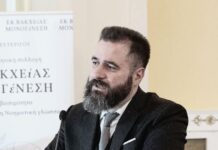Επιμέλεια: Εύα Πετροπούλου Λιανού
Philosophy of poetry
What is the relationship between poetry and philosophy?
According to the opinion of some specialists, philosophy began with poetry, especially in the search for the origin of the universe and things by the first natural philosophers, such as Thales and Heraclitus… Ancient and modern philosophers, especially Schelling, Lessing and Gaston Bachelard, together with the poets Shelley, Lord Byron, Tarfa and Al-Mutanabbi, sought the art of transforming thought into art so that it is free creativity, and so the relationship between it and poetry has remained controversial…
If we look closely at poetry and philosophy, we ourselves will discover an infinity of philosophical ideas suitable to be poetic material, in fact, they are characterized by an intrinsic poeticism, and in this study, we can comment on some of them, idea after idea, and then comment on them as a whole.
Planck says: It seems that philosophers, especially philosophers of science, do not make discoveries, but rather present hypotheses that we can define as poetic. The scientist Einstein was famous for saying: In every brilliant mathematical idea, there is a flash of poetry. , what metaphysical and existentialist philosophers present in terms of perceptions or ideas. We can call them poetic conceptions, and this means that philosophical conceptions often indicate to us that they are poetic conceptions in terms of a way of thinking or in terms of a habit of formulating concepts. Likewise, the composition of a poem, which carries with it the secret of its immortality must be filled with a vision, for the poet’s vision, is to change a series. From aesthetically formulated hypotheses generated by an understanding mind and thought sensitive. It responds to life experiences, this response, as you hear it in poetry, is an interpretation of life or a suggestion for another way of living, and it is the habit of formulating philosophical and poetic concepts that the creative human mind does through his creativity. Imagination, and is in the process of achieving perfection for himself to form a destiny as the philosophical thinker or an influential act wants. Creativity in beauty manifests itself in addition to existence as the poet-artist wants. Here we can achieve a profound rapprochement between the horizon of poetry and the horizon of thought, through the logic of perception, which constitutes the dynamic part of their imagination. Among these perceptions is the idea of an infinity of the world. It is certain that the perception of the infinity of the world is a perception of philosophy as much as a paradigm shift in poetry.
There is no doubt that the feeling that grips us of the infinity of the world is a feeling of something cosmic, it is cosmic poetry because it makes us realize in the same way how we can free ourselves from two limitations towards a wider horizon, to the absolute world, so that everything subjective and partial is transformed into the all-comprehensive world. The philosophical horizon, in its frantic search for Perfection as an end in itself, enters the world of Platonic ideals, or the world of the spirit that was identical before Hegel’s imagination, as one of the masterpieces of idealism. Likewise, this philosophical impulse transforms into a poetic impulse in which the poet unites with his poetic ideal through the convention of naming inspiration, intuition or intuition, and the power to evoke or appear with the eye of the imagination. Where knowledge becomes recovery of memory and the spirit becomes coherent with the worlds of prophecy, poets cling (between ruins and utopia) in describing the world of the impossible and the astonishing in the search for the treasure of human secrets that radiate from feeling and from the human subconscious to the world of predictions and metaphysics.
There are other perceptions in which poetry meets philosophy, including dualism, the opposite of existence, and determinism, which in some of its meanings means a logical breakdown of things, in the philosopher’s search for the secret of power of transience and nothingness and its implications in absurd behavior and the perception of the futile. Determinism, without a doubt, and in its simplest definitions, is the relationship of cause and effect, and the philosopher presented it according to the perspective of his logic to solve the problem of confusion regarding death, the death of the seasons, of things and man, in a conception without reference to the vision of religion and its interpretation. We therefore find two profound philosophical images, one of which is the image and representation of the deterministic act, in a pessimistic, nihilistic conception, and this is what Schopenhauer did and those who were influenced by him after him, or interpreting him. As a natural and realistic condition in which the philosopher encounters divine destiny. Here the philosopher presented it, trying to imagine the understanding of transience as a natural state experienced by beings, where they fade and disappear for the sake of a new birth, definition and development in this world.
These perceptions often opened the poet’s horizon, and in wisdom poetry, we can deduce the poets of humanity in general and Arabic poetry in particular, such as Tarfa, Ahmed Al-Mutanabbi, Al-Sayyab, Nazik and many others. who understood the inevitability of death as a vision and possibility of vanishing, and in their artistic perception of death. Just as we settle into the vision of John Keats, the poet fascinated by death and its worlds, the vision is his saving pilgrimage from the superficiality and repetition of poetry, and it is the only thing that brings success to poetry after having distanced it from it. Flatness and distortion.
There are other philosophical ideas characterized by intrinsic poeticism, the most important of which is the imitation of nature and its teeth by establishing dialogic philosophical hypotheses. Paul Fleiss said in his book Nature and Man: Every subject in the universe implies a certain degree of harmony with oneself. The material world, despite the influences of the eye, has become a non-material world. What he sees is not the external world, but rather an image of it, and therefore is an internal world. If we look closely at the claims of philosophers of natural science, we see them proclaiming that the events of nature are presented by the mind in in some way and then attributed to living bodies. However, in this process of perception, the mind radiates feelings that the mind reflects and adds to. On the things of the external world and these appear as if they possessed these qualities, but the new qualities of nature (the external world) are an invention of the mind, and so when the poet speaks to nature or about it, he clothes it with the same garment, and the worlds of his soul, and makes him a human being who speaks with the voice of an angel. He has a human feeling in them. A creativity that you did not possess before, and in this lies the secret of the creative faculty of poetry, and therefore the superior capacity of the human mind. nature, is a miserable thing that has no sound, no smell, no color, a matter that moves hastily, without meaning or purpose.
The form of nature here reminds us to imagine the vision of Gaston Bachelard, one of the pioneers of contemporary phenomenology in his approach to artistic creativity: if the form transforms into a person and the person into a form and image that simulates the world of nature, as happens in the representation of the night, the light and the stars in the poetic vision, Bache lard interprets it in a philosophically phenomenological key. As we understand in this fragmented text, the double eternity (good and evil) resides in the night. it cannot suggest to us a vision of space. Night and light were mentioned not for their vastness, not for their end, but rather for their unity. The night is not space, but is a harbinger of eternity. Night and light are two fixed things; black moments There are two happy moments and two sad moments in this poetic moment. Here he announces the meeting of contradictory feelings; here the poet transmits a more penetrating dialectic from matter to the unknown.
Or have we not said that poetry and metaphysics have common ground in the realm of poets and philosophers, and if it is right to say that the conception of all philosophy is right, we must support poetics in terms of conception and principle. who writes universal poetry in the language of prose, making use of abstract terms such as existence, subjectivity and causality, to talk about universals. Where this abstraction for the poet is transformed into an artistic embodiment, and the chaos of the poetic spirit and the struggle of the inner self are soon transformed into the presence of order, which is embodied in the geometry of poetry and the sequence of its ideas, precisely as happens in the presence of order in the philosophical horizon and in its logic.
The philosophical flash is poetry that transforms into an aesthetic, verbal and tonal flash that analyzes the philosophical complex and brings it into the human subconscious.
If today it is possible to describe the ideas of philosophy as poetic perceptions, then poetry can also be conceptualized as philosophical and cognitive, but we must finally recognize and declare that the thought that led to the perception in a poetic way is not necessarily the same as poetic writing, and vice versa: here lies the degree of originality of art and philosophy, or let’s say of poetry, or of thought.
Poetry was the hymn of humanity in which it experienced all its worries, weaknesses and strengths, and was stripped of all beautiful meaning.
Name: Souad Khalil
Country: Libya
She is a theater artist, writer, translator and poet, she writes for various magazines in Italian, Spanish and English, as well as Arab newspapers. You have received numerous awards and recognitions in all Arab countries and in some European countries. The University of Bonn has translated some of her poems into German. You have participated in literary salons in Europe and Latin America. Award winner Academy of Arts and Philosophical sciences.



































